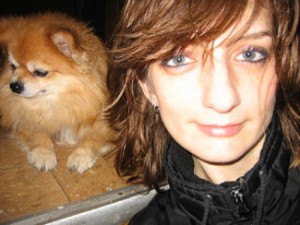A Contemporary Life
I pour infections from other countries into my path;
I embody the path’s impurities, the degradations of prostitutes
and mediocre doctors doing overnight shifts.
They make middle-grade wages & earn worldwide access to the internet.
I’m better than your next stranger, the one with a whip
who can handle words of a complex ilk without defining your face.
Oh like, you know it’s impossible to die
alone in these global end times. They telescope your days now
in such a way that you can no longer be alone
in a nanosecond or with echoes
to spare before the next consumption. You’re simply in it
and the violence is riveting you to only be beside yourself
as you watch and repeat nude dads on acid, as if saying
anything could mean something else.
I remain good at connecting people to their names – the self
is a favorite subject, even if you’ve never met one.
Like one room fucks another too, you’ll never be alone with me
here or outside of us.
We laugh at ancient aliens and how that guy fell down with his pants
around his neck or the woman at the next bar over
who cries herself into love with a bowl of suicides.
Adolph Hitler had a feeling for such feelings,
which is why he became so popular with films
about deadly birds and women
who weren’t there: he sensed the fear of death that snuggled up
with people and is the same reason David Lynch
has such a complete following
in the spiritual and thespian realms. It wasn’t just Hitler or George Bush
but Hitchcock too. I’ve been ashamed
to say these things until tonight
when the epiphanies rained down at the milk toast concert:
A brain is made mostly of water
traced by language and dissolved in ideas.
They danced up on me, the New York inhabitants I started
to live alone for. We grow closer every rush hour.
Logic doesn’t make sense in a place like this,
in a place like this. I didn’t know South African, so I took away
from the rapid-fire pigeon: invest in
pretend silence, pretend pitch perfect, pretend a round ball
is a star dying to know the great design of self.
Your good faith in me too has left a smudged impermanence,
though every self-aware puppet knows:
They’re making dumb sailors of us, we automatic
line workers of the culture wars where there is no fight left,
dying just to be our own market demand, endorsing
each other from fault lines, holding on for a less than flash mob lifestyle.
I walk the lone pregnant seconds, and from this
end of the dragging torso, I can see my own feet close up.
Strange Beauty
Because they are not easy, the clouds are like writers
asking for bread, for the sperm of the sun
and for that which brings us outside of ourselves
into our own. Franz Kafka’s doll parts
are Rilke’s childhood faces with white powder on
akin to lotus leaves and kabuki dolls
that have nothing on their cousin,
the Naomi pages of Bill Knott’s hysteria.
She is the beauty of remembering in pieces a person
who was never present except in her leaving.
I am your female Jesus, the beauty I’ve stolen
that discontinues artists. We go full art
now with our bills of sale, our trench warfare
from desk chairs. Don’t forget your protective fear
when hitting at brands that should not be masks;
brands should not be windows either.
Brands are both and then some.
Just like the weekend is a tease when we will write
the revolution, but no revolution comes
except in things
that grow food, heat and time away from the GDP.
If we are not what Naomi stands for,
if we are not what if Naomi is,
we are all alone in any moment,
waiting at the mouth of a bus stop,
a sky filled void of nowhere to go, behind the park bench
of rolling green smoke of a small patch
at city curbsides, creeping inside of a building,
cube after cube, boss head of upending sleep
that gives way to the bottomless jejunum of unrest.
I’ve heard of Jerusalem, Buddha, the great stallion riding
the world on its back; I am inappropriate
in my incestuous partnering
of visions where I hold out for the bottle to uncork
Baudelaire’s walks or Naomi to overtake my words again.
biography

Of I Want to Make You Safe (Litmus Press), John Ashbery describes AMY KING‘s poems as bringing “abstractions to brilliant, jagged life, emerging into rather than out of the busyness of living.” Safe was one of Boston Globe’s Best Poetry Books of 2011. King teaches Creative Writing at SUNY Nassau Community College and works with VIDA: Women in Literary Arts. Check her latest blog entries at Boston Review, Poetry Magazine and the Rumpus.